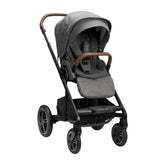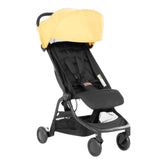Tips For Getting Pregnant 30-35: How To Boost Fertility

Starting a family in your 30s is an exciting milestone. With many women choosing to focus on their careers, education, or personal growth before having children, trying to conceive between 30 and 35 has become increasingly common, according to the Centers for Disease Control (CDC). That’s why ANB Baby is sharing practical advice, backed by trusted research, on how to prepare for pregnancy at age 30-35 and optimize your chances of conceiving naturally.
Why Does Age Matter in Fertility?
Fertility gradually declines with age due to changes in ovarian reserve (the number and quality of eggs). By your mid-30s, this decline accelerates, making it slightly more challenging to conceive compared to your 20s. However, many women in their 30s experience healthy pregnancies with proper preparation and care. Understanding how age impacts fertility can empower you to take actionable steps to support your reproductive health.
How to Prepare for Pregnancy at Age 30-35: What to Do Before Getting Started
Preparing your body and mind for pregnancy is essential, especially in your 30s. Here are some key steps to consider:
- Visit Your Healthcare Provider: Schedule a preconception check-up to discuss your medical history, current medications, and overall health. Tests to evaluate hormone levels and ovarian reserve can provide insights into your fertility status.
- Start Prenatal Vitamins: Begin taking a prenatal vitamin with at least 400 mcg of folic acid to support neural tube development and reduce the risk of birth defects.
- Address Existing Health Conditions: Conditions like polycystic ovary syndrome (PCOS) or thyroid imbalances can impact fertility. Work with your doctor to manage these before trying to conceive.
According to the American College of Obstetricians and Gynecologists, preconception care significantly improves pregnancy outcomes and reduces complications.
How to Get Pregnant Fast in Your 30s: Tips to Maximize Your Chances of Success
Conceiving quickly in your 30s often requires a strategic approach. Timing and preparation are critical:
- Track Ovulation: Ovulation usually occurs mid-cycle, about 14 days before your next period. Use ovulation predictor kits or fertility tracking apps to identify your most fertile days.
- Have Regular Intercourse: During your fertile window, aim for intercourse every 1-2 days to maximize your chances of conception.
- Boost Sperm Health: Encourage your partner to adopt a healthy lifestyle, including a balanced diet, regular exercise, and avoiding smoking or excessive alcohol consumption, as these factors influence sperm quality.
Studies suggest that knowing your ovulation patterns can increase your likelihood of conception by aligning intercourse with your fertile window.

Tips for Getting Pregnant at 30-35 During Ovulation: Using Timing to Your Advantage
Ovulation is the cornerstone of conception. To make the most of this fertile window:
- Use Ovulation Tests: These kits detect a surge in luteinizing hormone (LH), signaling ovulation within 24-36 hours.
- Track Cervical Mucus: Fertile cervical mucus resembles raw egg whites and is a natural indicator of ovulation.
- Time Intercourse Wisely: The days leading up to and including ovulation are your most fertile. Plan intimacy accordingly for the best chances of conception.
Understanding ovulation can significantly increase your odds of conceiving naturally. Tools like basal body temperature thermometers and fertility trackers can provide additional insights.
Is 35 Too Late to Start Trying for a Baby?
Absolutely not! The American College of Obstetrics and Gynecology notes that nearly 20% of births in the U.S. are to women aged 35 or older, highlighting that many women in this age group experience healthy pregnancies. While fertility declines as women age, many people in their mid-30s conceive successfully. Here's what to keep in mind:
- Understand Fertility Changes: Egg quality and quantity naturally decrease with age, but this doesn’t mean conception is impossible.
- Know When to Seek Help: If you’ve been trying for six months without success at age 35 or older, consult a fertility specialist. They can evaluate both partners and suggest options like intrauterine insemination (IUI) or in vitro fertilization (IVF).

Tips for Getting Pregnant at 30-35 Naturally: How Can I Be More Fertile at 35?
Boosting fertility at age 35 involves making informed lifestyle choices and addressing potential health concerns. Consider the following tips to increase your odds of conceiving naturally in your 30s:
- Eat a Nutrient-Rich Diet: Foods high in antioxidants, such as berries and leafy greens, can protect eggs from oxidative damage. Include plenty of lean protein, healthy fats, and whole grains. When it comes to fertility, plant-based proteins, like chickpeas, lentils, beans, tofu, tempeh, nuts, seeds and quinoa are superior to animal protein. In fact, a Harvard Health study found that infertility was more likely in 39% of women who ate a high intake of animal protein.
- Maintain a Healthy Weight: Both underweight and overweight individuals may experience hormonal imbalances that interfere with ovulation. Aim for a BMI between 18.5 and 24.9.
- Stay Active but Balanced: Moderate exercise supports overall health and reduces stress, but avoid overly intense workouts, which can disrupt ovulation.
- Limit Alcohol and Caffeine: Excessive alcohol and caffeine consumption can impact fertility. Stick to moderate or minimal intake.
- Quit Smoking: Smoking accelerates egg depletion and reduces fertility. Quitting smoking can improve your chances of conception within months.
- Manage Stress: High stress levels can disrupt ovulation and hormone production. Practices like yoga, meditation, and deep breathing can help you stay calm and focused during your conception journey.
Preparing for Parenthood: Shopping for Baby Essentials at ANB Baby
Your journey doesn’t end with conception—it’s only the beginning! Preparing for your baby requires the right products to support your pregnancy and early parenting years. At ANB Baby, we provide everything you need for this exciting stage:
- Pregnancy Support: From maternity bras to belly support bands, shop essentials to keep you comfortable and healthy.
- Baby Gear: Discover strollers, car seats, and baby carriers designed for convenience and safety.
- Nursery Must-Haves: Create a soothing space with cribs, bedding, and décor.
- Feeding & Care Products: Browse bottles, breast pumps, and baby monitors to simplify daily routines.

Your Pregnancy Journey Starts Here!
Getting pregnant in your 30s is a rewarding journey that requires preparation, patience, and positivity. By following these tips and consulting with trusted healthcare professionals, you can optimize your chances of conceiving naturally and enjoying a healthy pregnancy. When the time comes to shop for your baby, trust ANB Baby to provide the high-quality products you need to support your growing family.









